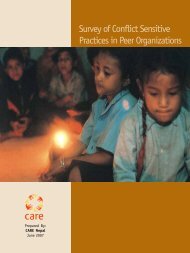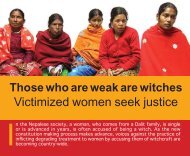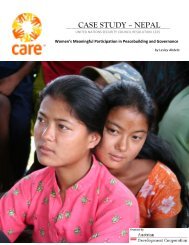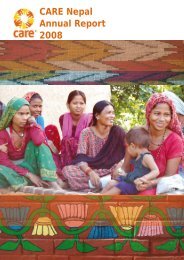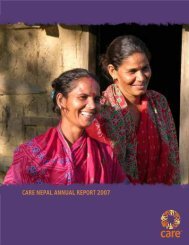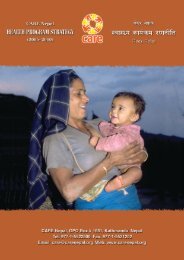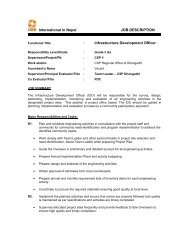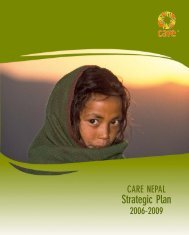Untitled - Care Nepal
Untitled - Care Nepal
Untitled - Care Nepal
You also want an ePaper? Increase the reach of your titles
YUMPU automatically turns print PDFs into web optimized ePapers that Google loves.
Consequences for psychosocial<br />
wellbeing<br />
It was identified that most of the symptoms<br />
reported by women were related to<br />
emotions which are placed in the heart (man<br />
in <strong>Nepal</strong>i language). Anxiety (chinta), fear<br />
(dar), sense of isolation (eklopan), sadness<br />
(dukha, pir) and sleeplessness (anindra) are<br />
commonly reported psychological<br />
problems of women. As reaction to their<br />
problems women reported becoming angry<br />
with family members and not wanting to<br />
listen to any one. Symptoms were reported<br />
differently but the causes mentioned were<br />
often similar.<br />
According to participants, fear and terror<br />
were omnipresent during the height of the<br />
armed conflict. An example of fear staying<br />
in the lives of women was talked about in<br />
reference to helicopters. If a helicopter (chil<br />
gadi, local terminology of helicopter) flew<br />
across the sky, they remembered the<br />
incident when bombs were thrown from<br />
night vision helicopters to their village<br />
which scares them till today. During the<br />
conflict women reported being tense when<br />
wondering whether their children would<br />
return from school or not. If any explosion<br />
was heard, women got worried that either<br />
husband or children were affected.<br />
Mostly the participants from Sarlahi and<br />
Mahottari shared tension that remained<br />
between the people who migrated from hill<br />
areas (pahadi) and the local residents of the<br />
Terai (madhesis). Women shared that they had<br />
fear of madhesi people that they might attack<br />
them. Therefore, they were scared even to<br />
go to the district headquarter because of<br />
heavy presence of madhesis in the district<br />
headquarter. The situation explained by<br />
participants was terrible in terms of security<br />
and stability. Women were reported to be<br />
regularly raped and killed by unknown<br />
groups, due to which women did not feel<br />
comfortable traveling alone.<br />
SUGGESTIONS FROM<br />
RESEARCH<br />
PARTICIPANTS<br />
The research participants of this study were<br />
asked to provide suggestions that could be<br />
taken up in new project that focused on the<br />
psychosocial well being of women.<br />
Following were the suggestions:<br />
• Awareness raising on the importance<br />
of psychosocial well-being of womens.<br />
• Assurance of equal participation of<br />
women and men from socially excluded<br />
groups such as dalit and janajatis in all<br />
development efforts.<br />
• Improvement at policy level (engaging<br />
women and other socially excluded<br />
groups into the political decision<br />
making processes).<br />
• Involvement of poor and conflict<br />
affected women in income-generating<br />
activities<br />
• Educational support (both formal and<br />
informal by increasing access)<br />
• Emotional support<br />
According to the research participants, to<br />
solve the social problems, it was suggested<br />
that the rights of women needs to be<br />
explained to both men and women. For<br />
political participation of women it was<br />
suggested that women need more awareness<br />
about political activities and their impacts<br />
4<br />
Psychosocial Issues of<br />
Women affected by conflict



